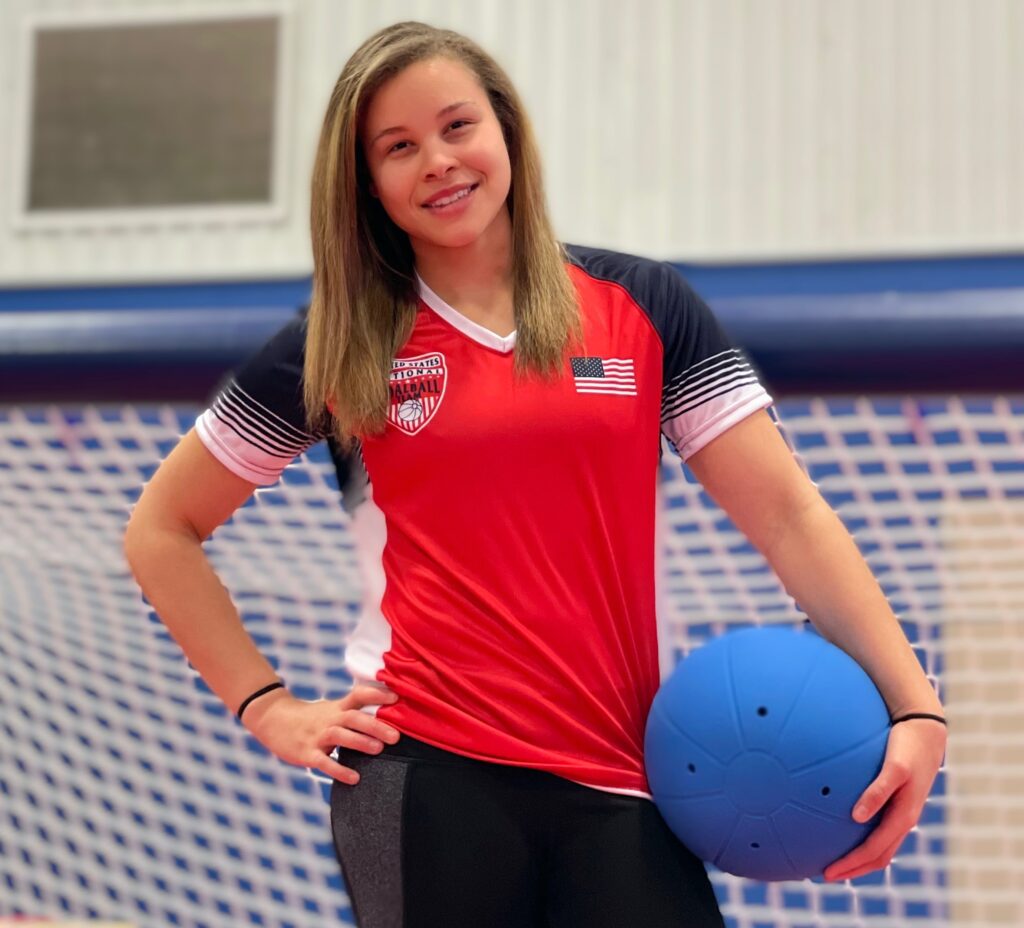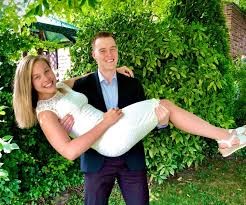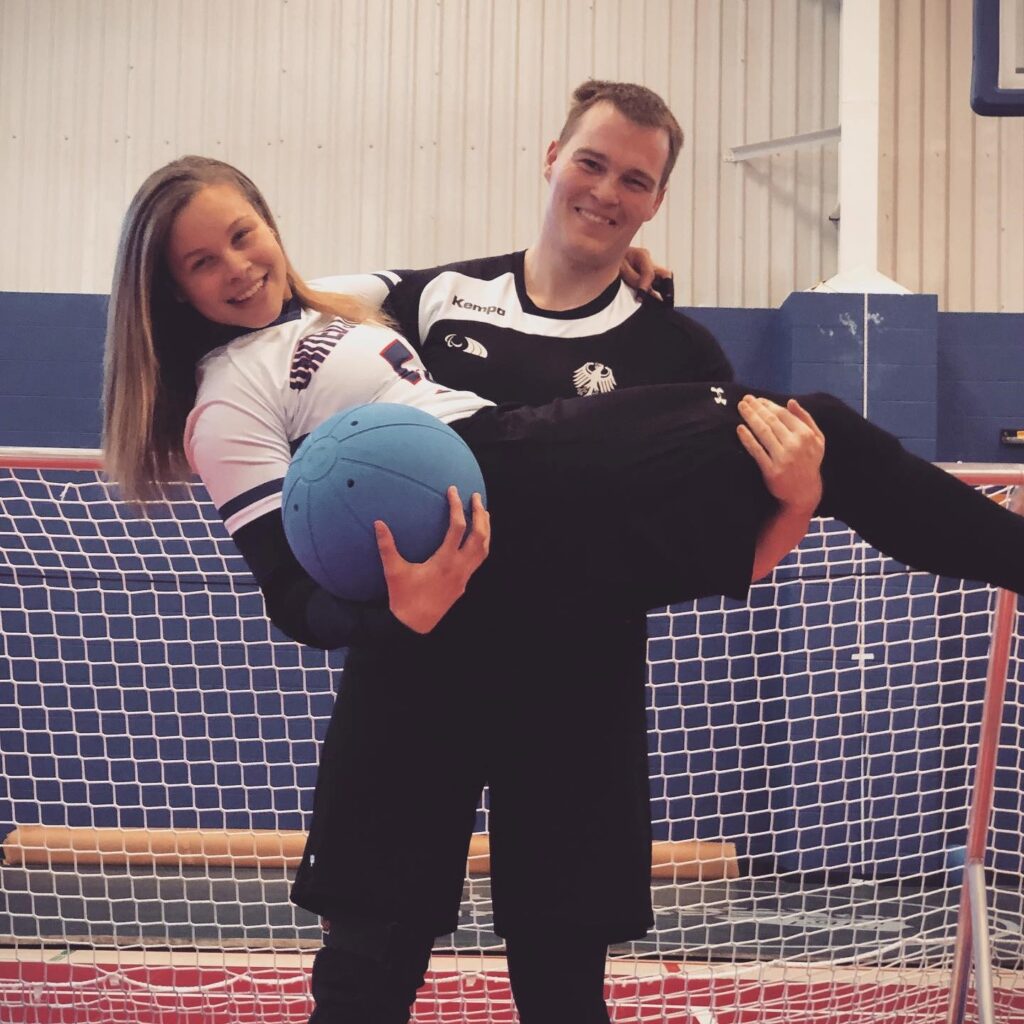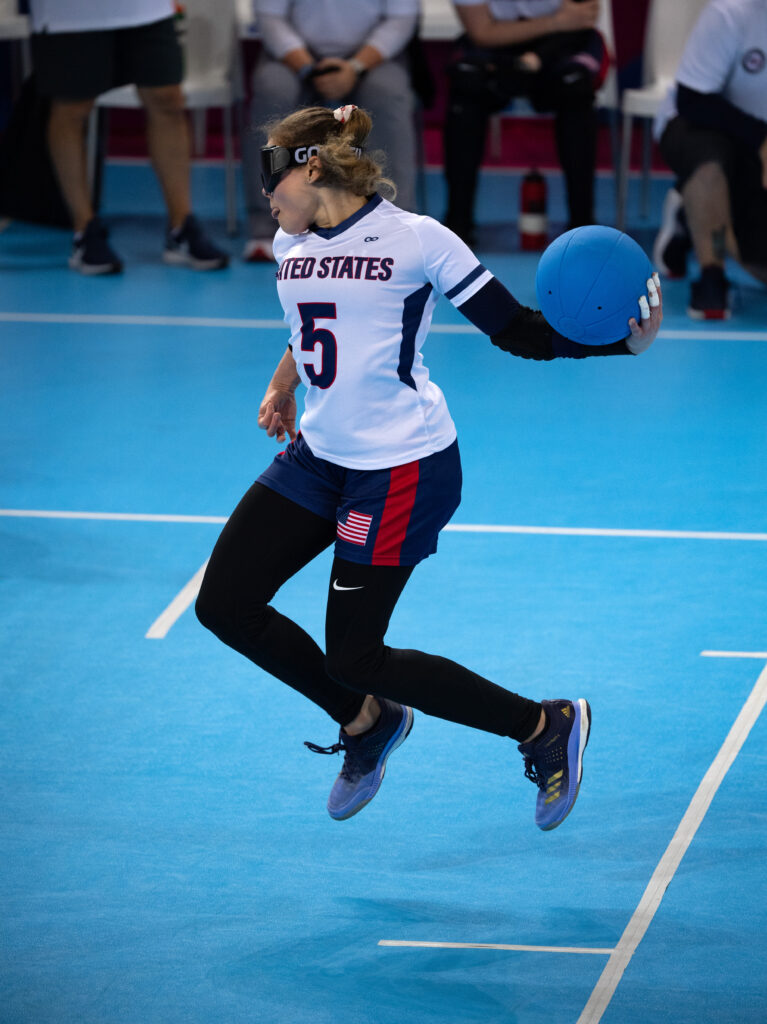Goalball Gametime with Amanda Dennis

Aiming for her third straight Paralympic Games, 27-year-old Amanda Dennis spent the past year getting married to German goalball player Michael Feistle and training for much of the year in Berlin. Find out more about this ambidextrous lover of sweets in this Q&A:
Q: How were you first exposed to goalball?
A: When I was little I played soccer for a season, because my older brother did that, and I wanted to be like him. I got enrolled for a team and played a couple of practices before I figured out I had a dramatic lapse in my abilities because I couldn’t really see anything outside. I have a visual condition called aniridia (which means I don’t have an iris). This limits my ability to see outside in light conditions, and also when it’s too dark. I decided at that young age I didn’t want to play sports again. Later on, I started receiving vision services at The Center for The Visually Impaired in Atlanta where I had my first exposure to other visually impaired peers, and this is where I first heard about goalball because Atlanta was looking to start a team. Another opportunity arose because Blaze Sports America was also hosting a sports education camp for blind and visually impaired kids and teens to learn about adapted sports.
Blaze Sports America is the Paralympic legacy organization left behind by the 1996 Summer Paralympic Games in Atlanta. They serve many diverse disability classes and bring sports into their lives. This sports education camp I attended was one of my first goalball memories. This camp had so many different sports showcased such as track and field, judo, swimming, adapted soccer, goalball, etc. BSA brought Paralympic role models from these sports to show their medals and share their stories. This was such an inspiring moment for me to see what these athletes achieved. Among the sports that allured me was goalball. Goalball was so different than any other sport at this camp, and I think that’s what pulled me in the most. From that camp, my parents were also really supportive in me starting to play goalball. They drove me an hour to practices two times a week in Atlanta, which allowed me to play the sport recreationally and competitively.
Q: Despite the pandemic, 2020 was a memorable year for you. You got married and lived and trained abroad for much of the year. Tell us about your husband and what it was like living and training outside the U.S.

A: My husband is the starting center on the German National Goalball Team. I have known him since I was 17. We met for the first time at the 2011 IBSA Youth Worlds and Student Games competition in Colorado Springs. We reconnected over the years and built a really close relationship, and now we’re married. I think it’s been really great because both of us have the same goals for Tokyo, so we keep each other motivated no matter where we are, and what we do. It’s always amazing to have someone who understands the sacrifices you make towards achieving your goals and not only support you in doing so but can make you better in the process.
My husband has definitely helped me make an easy transition from living in Fort Wayne and having a full-time training structure to living in Berlin and having a similar structure and support. He was able to set everything up with the help of our national team coaches and his contacts throughout the Paralympic Committee over there to allow me the ability to train at the OTC and receive resources like physical therapy.
Training outside of the U.S. was definitely a different kind of experience. I was able to see how sport structures were in Europe and experience more co-ed playing styles. I have been very lucky to receive some similar support in Germany in terms of training venues, resources, and training support, but for me personally, it’s not nearly as exceptional or appealing as our structure in Fort Wayne. I like the idea that I can come to Fort Wayne whenever I want to stay for longer periods and practice with my teammates. This is a structure that Germany doesn’t have on a national team level. I can only tell you about my current experience over there, because it is somewhat limited due to the strict lockdown from March 2020 to now, so it limited our training capacity via goalball, but I was definitely overwhelmed and thankful for the ability to train with my club team in Berlin and have the ability to train at the Olympic Training Center in Berlin. The U.S. and China are the only two countries that have resident programs for goalball running all year round. Many other European countries don’t have this, just because of how close players live to each other and the ease of access to public transportation giving them the ability to meet multiple times per week to train if they’d like. We are very lucky in the U.S. to have this structure that offers us the best training possible with specialized coaches for goalball, strength and conditioning, sport psychology, nutrition, and athletic training.

Q: How have you managed to stay driven and focused with COVID-19 affecting your everyday life?
A: I think last year our team had everything together on the goalball court in terms of what we wanted to do, our playing style, and mindset heading into Tokyo. Because of the COVID-19 pandemic and the postponement of Tokyo 2020, we immediately had to adapt to many new different kinds of training environments: at-home programs, working-out-with-what-you-had programs, medicines for coronavirus, gym programs, etc. I believe this ability to adapt to our current environment at the time made us stronger and more flexible. The extra year to prepare — on the court, mentally, in the weight room — has already given us a big insight into some of the gains we’ve made in the postponed year, and that is one of the things that motivates us and drives us forward.
Q: Do you have a warm-up routine? Is there any music you like to listen to before a game?
A: Our team has a general warm-up routine provided by strength and conditioning coach EJ Whitney which people incorporate before games, and each player also adds a little bit of their individual flair if they have preferred warm-up exercises. We usually have a DJ (someone with a speaker and a playlist) play songs before a game. It’s all the combined songs that we like.
Some songs I really like before games:
- Fight Song by Rachel Platten
- The Fighter by Gym Class Heroes
- Wir Sind Groß (it’s a German song) by Mark Forster
- Lose Yourself by Eminem
- High Hopes by Panic! At the disco
- Game Time by Flo Rida
Q: Do you have a favorite cheat food?
A: I pretty much love everything that’s horrible for you. I’m someone who likes sweet food, so I’m happy to have cake, cookies, ice cream, etc. But my favorite things to have outside of our nutrition plan are Krispy Kreme doughnuts, Cinnabon cinnamon rolls, and red velvet cake.
Q: Do you have a favorite goalball athlete?
A: I’m not sure if I’d say I have a favorite goalball athlete in terms of playing style. There are so many talented goalball athletes throughout the world. I would say I have a favorite athlete in terms of personality and communication. I talk to Lihi Ben David from Israel a lot. She has a really straightforward and feisty personality that fits really well with mine. She’s always fun to talk to in discussions about goalball and other related topics like life, school, jobs, etc.
Q: Lastly, what is one interesting fact that not a lot of people know about you?
A: Most people know that I’m left-handed in the goalball world, but a lot of people don’t know that I actually started learning how to play goalball at the age of 7 right-handed. I am somewhat ambidextrous, there are a lot of things I prefer doing right-handed instead of left. Because of this, I actually can throw decently right-handed as well and was able to work on this throughout our postponement year.

Amanda Dennis bio
Related Posts
Force, Monarchs and Renegades win gold at Southeast QualifierA Look Back on the Road to Paris…2016 Rio Paralympic Games
A Look Back on the Road to Paris…2004 Athens Paralympic Games
A Look Back on the Road to Paris…1988 Seoul Paralympic Games
A Look Back on the Road to Paris…1984 New York Games
